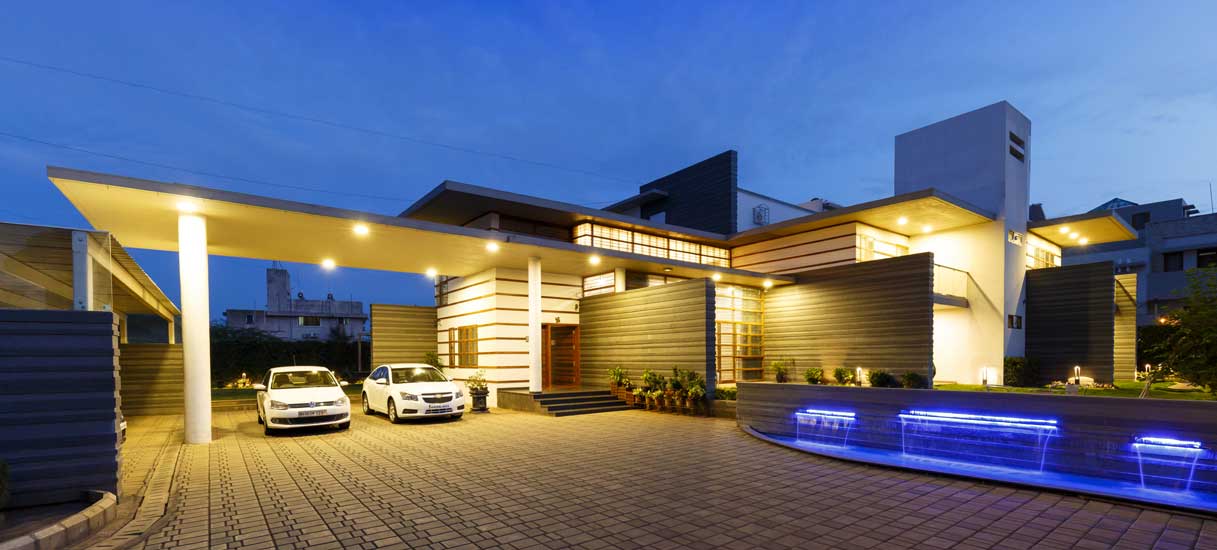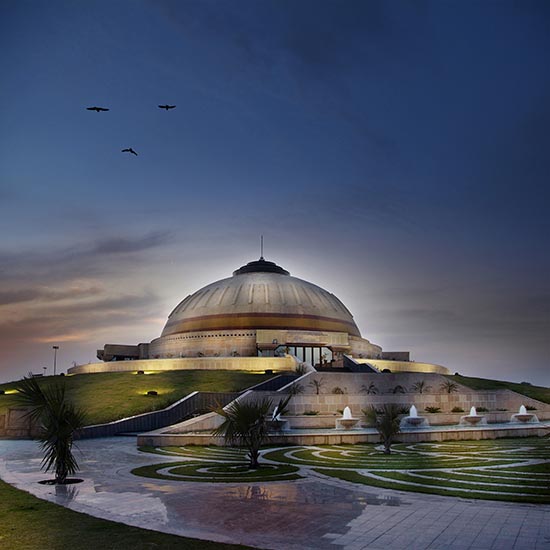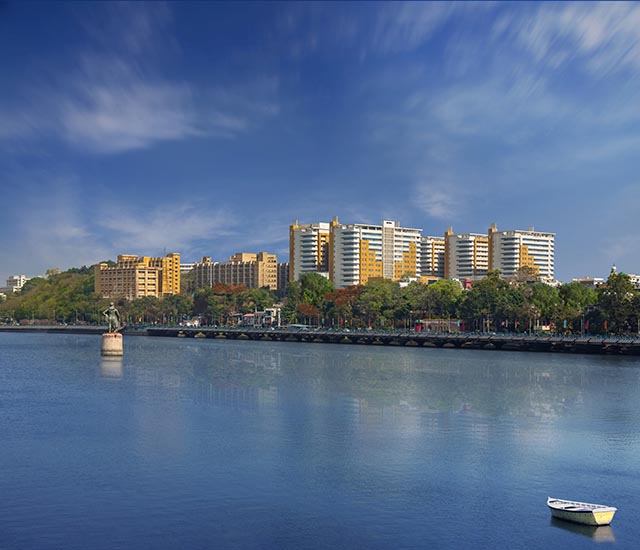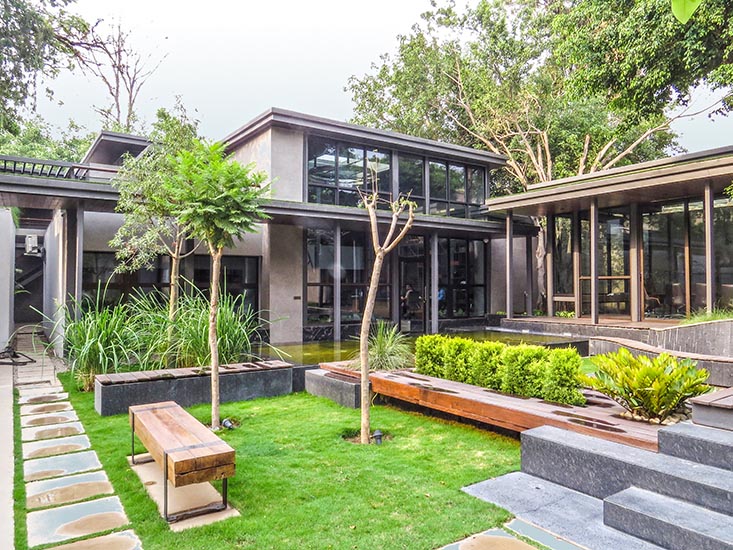
Project Name: Woven House, Ichalkaranji
Architectural Group: Sunil Patil & Associates
Project Location: Ichalkaranji, Maharashtra, India
Project Type: Residential, Interior Design
Architects/Design Team: Ar. Sunil Patil, Ar. Anuja Pandit, Er. SanjayPatil
Site Area: 17,550 sq.ft
Built-Up Area: 8986 sq.ft
Year: Sep 2014
Image Courtesy: Sanjay Chougule
Taking inspiration of city’s famous textile weaving, the house is designed with patterns on walls, furniture and art. In the free-flowing spaces, the interior decor creates defined spaces & gives warmth through its patterns and textures. White walls and glass also form a pattern completing the feel of Woven house.
Project brief
The project brief was to design a bungalow with large living areas with kitchen and dining. Family spaces with three master bedrooms, two children’s bedrooms and a guest bedroom. The house also needed home theatre, gym, library and a hobby room.
Context and Climate
Ichalkaranji falls in the hot and dry climate zone with a warm and humid monsoon. The design is based on climate responsive architecture with courtyard planning and high thermal mass walls. Open planning allowing natural ventilation through large openings covered by large overhangs – allowing diffused light and ventilation and blocking high solar radiation.
Design Philosophy
While designing a house it is impossible to separate architecture, interiors and landscape design as they have to compliment and not dominate each other.
Interior designing is not an afterthought, in fact, the basic parameter for designing any space is the interior layout.
Hence the design of any space starts with the interior designing itself.
The architectural form and the fenestrations in the building envelope are governed by the interior layout.
The interior decoration gives character to space hence appropriate use of materials, colours and textures are of paramount importance.
This project was a complete assignment of architecture, interiors and landscape designing.
Hence, it was a need to design architecture, interior and landscape in harmony with each other.
Concept
The architectural style of the bungalow is inspired by the city and its textile. The stone walls are designed as fabric pattern and it continues in interiors on wood and furniture. White walls and glass also form a pattern completing the feel of Woven house.
Planning
Spread on the large plot, this house has a simple plan which is derived out of functionality of spaces, catering to clients needs. The public and private spaces are segregated within the house.
Original idea was to create boundary-less spaces which flow into each other and then in the landscape. Interior decor complements the idea yet creates defined spaces keeping the flow of the spaces intact.
Public areas like living, dining and family are designed around the courtyard. All the spaces in the house flow in the landscape creating harmony with nature.
Double height living and courtyard allow visual connection between the spaces at the upper level . Glass railings help in enhancing this effect.
Design features
The palette for this project is grey stone and ceramic flooring, white painted walls enhanced with wood, which brings warmth to the decor.
The materials are used with surface variations creating subtle patterns, as per the theme of the house.
- Stone Cladding: The walls have been cladded with tandoor stone to achieve high thermal mass in hot- dry climate of the city. The pattern of tandoor stone cladding is inspired by textile. The strip pattern enhances free-standing walls and continues from exterior to interior forming elements of interiors.
- Fenestrations: The windows are made of teak wood in order to match the rustic appeal of the house and seems like the continuity of the tandoor cladding.
Along with architecture and interior, even the artwork has been designed by us in the same ethos adhering to the theme of the woven house.
- Mural: Double height mural in the courtyard is another artwork inspired by the pattern. The wooden piece of art continues from ground floor to the first floor. Wooden strips have been used forming patterns from nature in a subtle way.
The mural is inspired by the five elements of nature:-
- Ether-(Akash) denoted as a globe.
- Earth- (Bhumi) associated as a plant
- Air-(Vayu)interpreted as bird in flight
- Water- (Jal) 70% of the earth’s surface is covered with water, hence depicted as Mother Earth
- Fire-(Agni) construed as a burning flame.
The mural and the courtyard compliments each other depicting the five elements in their own term. The space blends at the same time is enhanced by various architectural elements.
Even the furniture has been designed with detailing, creating unique style and decor. The pattern has been the soul of the woven house. The self-pattern through the placement of material on different levels has created beautiful and subtle texture throughout the house.
- Customized Sofa: Grey checkered pattern was an inspiration for sofa design. The square module is used creating seating at different levels. Grey floor, wooden carpet & grey shades of fabric sofa create an interesting element in the formal living area.
- Bedroom1: Master bed has siporex art mural as the background wall. The organic form is generated as if the fabric is hanging on the wall. The curves and unevenness of the fabric are superiorly depicted through siporex mural.
- Bedroom 2: Master bed with texture back panels and indirect lighting.
- Home Theater- The Elongated Home Theater with grey walls and alternate glow lights enriches the beauty. The big brown sofa implies a real “Cinema Experience” at home.
- Stair Case: The sleek wooden Staircase is embedded with ss pipes as railing, highlighting the design concept “the Woven “.
- Dining: The stylish Lamps from the wooden ceiling in the dining room are enough to compliment.
- Pool: Gazebos provides a fantastic shady spot to relax and enjoy the Poolside
Green features
- Climate responsive architecture
- Ample daylight and ventilation – Common areas naturally ventilated
- Courtyard planning & Landscape as micro-climatic modifier
- Large overhangs to protect from solar radiation
- Thermal mass through stone masonry















